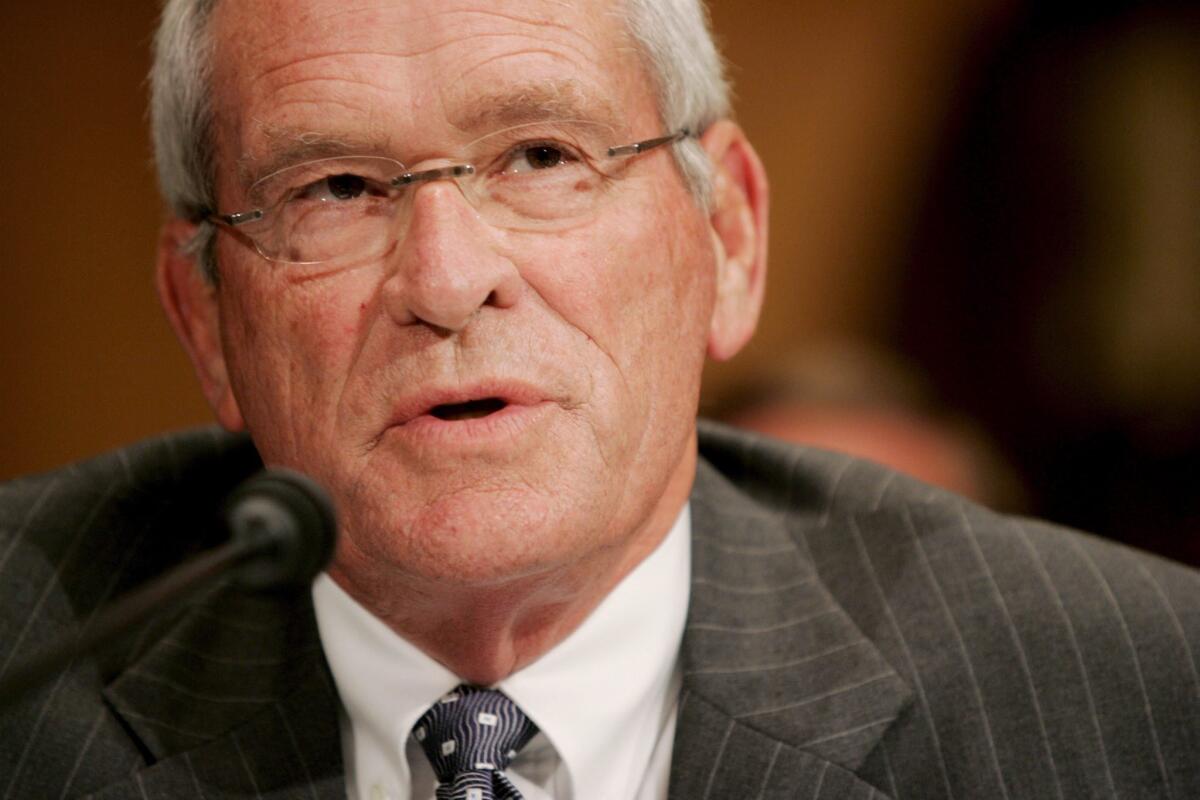Opinion: Will Wheeler’s net neutrality rules lead to online toll lanes?

A common assumption underlying the net neutrality debate is that broadband ISPs will impose tolls on content providers, and content providers will pass those costs on to consumers, if only the Federal Communications Commission lets them.
Witness this passage from a piece in Friday’s Los Angeles Times about the net neutrality proposal being floated by FCC Chairman Tom Wheeler: “ ‘It could create a tiered Internet where consumers either pay more for content and speed, or get left behind with fewer choices,’ warned Delara Derakhshani, policy counsel for Consumers Union.”
Just to be clear, consumers already have to pay more for high-value content (e.g., Hulu Plus, Netflix, MLB.com) and speed (a 30 Mbps connection costs more than a 5 Mbps one). What net neutrality is about is fees at the other end of the ISP’s pipe -- the end that faces the Web.
The fear felt by Derakhshani and many others is that wireline ISPs, which face little or no competition for residential users, will entice or even force content and service providers to pony up in order to connect with those users. Those companies already pay their own ISPs and content distribution networks to carry their data across the Internet; net neutrality advocates want to protect them from having to pay again to cross the last mile.
But how realistic is the fear of toll lanes? At this point, it’s based largely on speculation -- which is not to say it’s unfounded or unreasonable, just that it’s guesswork. And Derakhshani’s team seems to be ignoring some factors that protect against the worst-case scenarios they’re predicting.
The best evidence that ISPs want to establish toll lanes is AT&T’s “sponsored data” initiative on its wireless network, a network not covered by the FCC’s previous ban on “unreasonable discrimination” by ISPs. In this initiative, AT&T offered apps and content providers the chance to cover the wireless data charges incurred by their users.
That’s one of only a handful of actual instances of an ISP tipping the last-mile playing field. It’s also an example of how ISPs could construct a deal that would upgrade one content provider’s access to its customers without downgrading all others’ access.
Most of the critics of Wheeler’s proposal focus on a different form of preferential treatment: data prioritization. If an ISP were to offer higher prioritization for a company’s data in exchange for a fee, that would automatically hurt every other source of data when traffic is congested.
Prioritization is, indeed, a scary thing. That’s why Wheeler has proposed asking the public whether any type of preferential treatment should be branded “commercially unreasonable” on its face. Wheeler’s proposal would bar preferential treatment if it’s “commercially unreasonable” -- language borrowed from another rulemaking that has survived court scrutiny, unlike the commission’s previous stabs at net neutrality regulations.
Even if prioritization were not per se unreasonable, the FCC could construct the rules in a way that makes it hard for an ISP to justify offering it. To decide whether a deal is commercially unreasonable, Wheeler would have the FCC consider a number of factors, including its effect on competition, innovation and free expression. Partnerships between ISPs and content providers that put one company’s bits ahead of its rivals’ bits in the data queue clearly raise questions about anti-competitive effects. Would such a deal make it impossible for rivals to attract an audience? Would it effectively close the market to new entrants by making it too expensive for them to reach consumers?
Those kinds of questions would arise even if the FCC didn’t have neutrality rules, however. A content provider that paid ISPs to degrade the service available to its competitors would likely run afoul of the Federal Trade Commission or the Department of Justice. That might explain why such deals didn’t get struck in the years before the FCC formally enacted its rules or in the months since they were struck down by the District of Columbia Court of Appeals.
I tend to think of net neutrality in terms of the risks posted by willing buyers and sellers -- deep-pocketed sites and services that want better access to customers and ISPs happy to sell it to them. Wheeler’s most vocal critics, on the other hand, frame the issue in terms of near-monopoly ISPs extracting rents from content and service providers, who either pay the higher fees (and pass them on to their customers) or shut down.
That’s a conceivable result of having no neutrality rules and lax antitrust enforcement. But Wheeler isn’t proposing to give ISPs a green light to impose tolls. Instead, the anti-blocking rule he floated this week seeks to bar ISPs from providing sites so little bandwidth that they can’t offer a service that’s acceptable to consumers.
Granted, the comments that Ed Whitacre made as chief executive of SBC (now AT&T) to BusinessWeek in 2005 hang over the proceedings like Voldemort’s shadow. When asked how concerned he was about online upstarts such as Google, MSN and Vonage, he replied, “What they would like to do is use my pipes free, but I ain’t going to let them do that because we have spent this capital and we have to have a return on it. So there’s going to have to be some mechanism for these people who use these pipes to pay for the portion they’re using. Why should they be allowed to use my pipes? The Internet can’t be free in that sense because we and the cable companies have made an investment, and for a Google or Yahoo or Vonage or anybody to expect to use these pipes [for] free is nuts!”
Maybe that’s why Derakhshani is so afraid of a tiered Internet. Whitacre left AT&T long ago, but his words are permanently etched in the collective memory of the Net.
ALSO:
The U.S. can’t let Cliven Bundy win his range war
For California’s sake, Irwindale needs to save its Sriracha plant
In Russia, Ukraine crisis is U.S.’s fault: ‘Who is Obama, the czar of the world?’
Follow Jon Healey on Twitter @jcahealey and Google+
More to Read
A cure for the common opinion
Get thought-provoking perspectives with our weekly newsletter.
You may occasionally receive promotional content from the Los Angeles Times.











